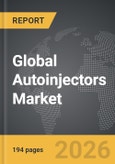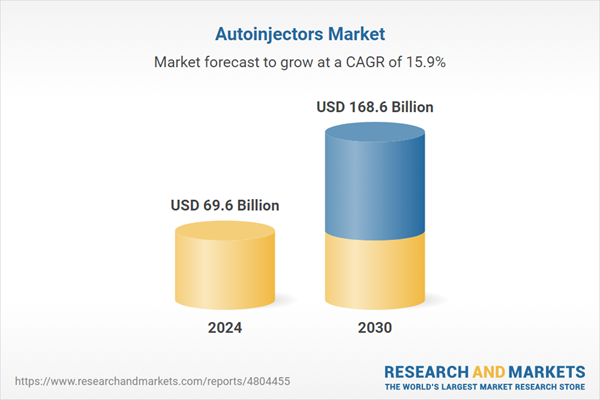Global Autoinjectors Market - Key Trends and Drivers Summarized
Why Are Autoinjectors Revolutionizing Chronic Disease Management?
Autoinjectors are transforming the landscape of chronic disease management by providing a user-friendly, efficient, and safe method for administering medication. Designed to allow patients to self-administer their treatment with minimal training, autoinjectors are particularly beneficial for individuals with conditions like rheumatoid arthritis, multiple sclerosis, and severe allergies, where regular injections are necessary. These devices are pre-filled and pre-measured, reducing the risk of dosing errors and making them ideal for patients who require regular, long-term treatment. The simplicity and portability of autoinjectors have empowered patients to manage their health more independently, reducing the need for frequent hospital visits and improving adherence to prescribed therapies. This shift towards self-administration aligns with the broader trend of patient-centered care, where convenience and ease of use are paramount.How Are Technological Innovations Shaping the Future of Autoinjectors?
Technological advancements are playing a critical role in enhancing the functionality and appeal of autoinjectors. Innovations in needle design, for example, have led to the development of ultra-thin needles that minimize pain and discomfort during injections, making the experience more tolerable for patients. Additionally, the integration of smart technology into autoinjectors is becoming increasingly common, with devices now featuring digital connectivity that allows for monitoring and tracking of injections. This is particularly useful for chronic conditions where adherence to a strict medication schedule is crucial. Smart autoinjectors can send reminders to patients, log injection times, and even alert healthcare providers if doses are missed. Furthermore, advancements in drug formulation are enabling the use of autoinjectors for a wider range of medications, including biologics, which often have higher viscosity and were previously challenging to administer using traditional devices. These technological improvements are not only enhancing the patient experience but are also expanding the therapeutic applications of autoinjectors.What Market Dynamics Are Driving the Adoption of Autoinjectors?
The adoption of autoinjectors is being driven by several key market dynamics, including the increasing prevalence of chronic diseases, a growing focus on patient safety, and the rising cost of healthcare. As chronic conditions become more common globally, there is a corresponding need for effective and convenient treatment options that patients can manage independently. Autoinjectors meet this need by providing a reliable method of drug delivery that reduces the burden on healthcare systems. The emphasis on patient safety is also driving the development and adoption of autoinjectors, as these devices are designed to minimize the risk of needlestick injuries and dosing errors. Additionally, the shift towards home-based care and the rising cost of healthcare services are encouraging the use of autoinjectors as a cost-effective alternative to in-clinic injections. The pharmaceutical industry is also playing a role, with many companies developing new drug formulations specifically designed for use with autoinjectors, further driving market growth.What Is Driving the Growth in the Autoinjector Market?
The growth in the autoinjector market is driven by several factors, each contributing to the increasing adoption and innovation of these devices. One of the primary drivers is the rising prevalence of chronic diseases, such as diabetes and autoimmune disorders, which require regular, long-term treatment that autoinjectors are well-suited to deliver. Technological advancements, including the development of smart autoinjectors and improvements in needle design, are also propelling market growth by enhancing the functionality and ease of use of these devices. The trend towards patient self-administration and home-based care is another significant factor, as autoinjectors offer a convenient and effective solution for managing chronic conditions outside of clinical settings. Additionally, the expansion of healthcare infrastructure in emerging markets is creating new opportunities for autoinjector adoption, as these regions experience increased demand for advanced medical devices. Finally, the pharmaceutical industry's focus on developing biologics and biosimilars, which are often administered via autoinjectors, is further fueling market expansion. These factors, combined with the ongoing trend towards personalized medicine, ensure that the autoinjector market will continue to grow in the coming years.Report Scope
The report analyzes the Autoinjectors market, presented in terms of market value (USD). The analysis covers the key segments and geographic regions outlined below.- Segments: Therapy (Rheumatoid Arthritis, Anaphylaxis, Multiple Sclerosis, Diabetes, Other Therapies); Type (Disposable Autoinjectors, Reusable Autoinjectors); End-Use (Home Care Settings, Hospitals & Clinics, Ambulatory Care Settings).
- Geographic Regions/Countries: World; United States; Canada; Japan; China; Europe (France; Germany; Italy; United Kingdom; Spain; Russia; and Rest of Europe); Asia-Pacific (Australia; India; South Korea; and Rest of Asia-Pacific); Latin America (Argentina; Brazil; Mexico; and Rest of Latin America); Middle East (Iran; Israel; Saudi Arabia; United Arab Emirates; and Rest of Middle East); and Africa.
Key Insights:
- Market Growth: Understand the significant growth trajectory of the Disposable Autoinjectors segment, which is expected to reach US$101.1 Billion by 2030 with a CAGR of 16.3%. The Reusable Autoinjectors segment is also set to grow at 15.3% CAGR over the analysis period.
- Regional Analysis: Gain insights into the U.S. market, valued at $18.5 Billion in 2024, and China, forecasted to grow at an impressive 21.4% CAGR to reach $40.9 Billion by 2030. Discover growth trends in other key regions, including Japan, Canada, Germany, and the Asia-Pacific.
Why You Should Buy This Report:
- Detailed Market Analysis: Access a thorough analysis of the Global Autoinjectors Market, covering all major geographic regions and market segments.
- Competitive Insights: Get an overview of the competitive landscape, including the market presence of major players across different geographies.
- Future Trends and Drivers: Understand the key trends and drivers shaping the future of the Global Autoinjectors Market.
- Actionable Insights: Benefit from actionable insights that can help you identify new revenue opportunities and make strategic business decisions.
Key Questions Answered:
- How is the Global Autoinjectors Market expected to evolve by 2030?
- What are the main drivers and restraints affecting the market?
- Which market segments will grow the most over the forecast period?
- How will market shares for different regions and segments change by 2030?
- Who are the leading players in the market, and what are their prospects?
Report Features:
- Comprehensive Market Data: Independent analysis of annual sales and market forecasts in US$ Million from 2024 to 2030.
- In-Depth Regional Analysis: Detailed insights into key markets, including the U.S., China, Japan, Canada, Europe, Asia-Pacific, Latin America, Middle East, and Africa.
- Company Profiles: Coverage of players such as AbbVie, Inc., Amgen, Inc., Antares Pharma, Inc., Becton, Dickinson and Company, Consort Medical PLC and more.
- Complimentary Updates: Receive free report updates for one year to keep you informed of the latest market developments.
Some of the 42 companies featured in this Autoinjectors market report include:
- AbbVie, Inc.
- Amgen, Inc.
- Antares Pharma, Inc.
- Becton, Dickinson and Company
- Consort Medical PLC
- Eli Lilly and Company
- Haselmeier GmbH
- Mylan NV
- Owen Mumford Ltd.
- SHL Group
- Teva Pharmaceutical Industries Ltd.
- Ypsomed AG
This edition integrates the latest global trade and economic shifts into comprehensive market analysis. Key updates include:
- Tariff and Trade Impact: Insights into global tariff negotiations across 180+ countries, with analysis of supply chain turbulence, sourcing disruptions, and geographic realignment. Special focus on 2025 as a pivotal year for trade tensions, including updated perspectives on the Trump-era tariffs.
- Adjusted Forecasts and Analytics: Revised global and regional market forecasts through 2030, incorporating tariff effects, economic uncertainty, and structural changes in globalization. Includes historical analysis from 2015 to 2023.
- Strategic Market Dynamics: Evaluation of revised market prospects, regional outlooks, and key economic indicators such as population and urbanization trends.
- Innovation & Technology Trends: Latest developments in product and process innovation, emerging technologies, and key industry drivers shaping the competitive landscape.
- Competitive Intelligence: Updated global market share estimates for 2025, competitive positioning of major players (Strong/Active/Niche/Trivial), and refined focus on leading global brands and core players.
- Expert Insight & Commentary: Strategic analysis from economists, trade experts, and domain specialists to contextualize market shifts and identify emerging opportunities.
Table of Contents
Companies Mentioned (Partial List)
A selection of companies mentioned in this report includes, but is not limited to:
- AbbVie, Inc.
- Amgen, Inc.
- Antares Pharma, Inc.
- Becton, Dickinson and Company
- Consort Medical PLC
- Eli Lilly and Company
- Haselmeier GmbH
- Mylan NV
- Owen Mumford Ltd.
- SHL Group
- Teva Pharmaceutical Industries Ltd.
- Ypsomed AG
Table Information
| Report Attribute | Details |
|---|---|
| No. of Pages | 194 |
| Published | February 2026 |
| Forecast Period | 2024 - 2030 |
| Estimated Market Value ( USD | $ 69.6 Billion |
| Forecasted Market Value ( USD | $ 168.6 Billion |
| Compound Annual Growth Rate | 15.9% |
| Regions Covered | Global |









